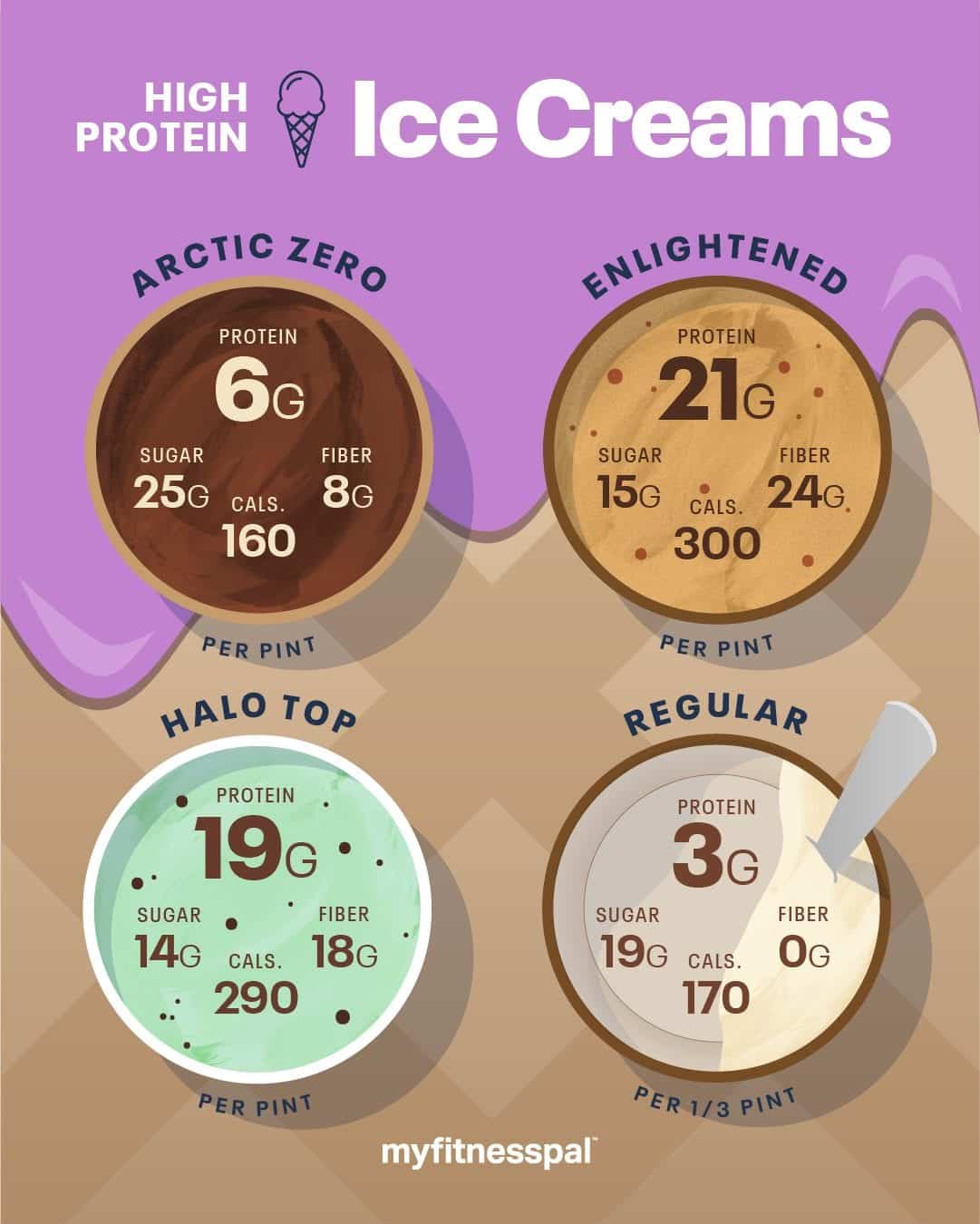High-protein ice cream, which typically contains fewer calories and sugar than traditional ice cream, has been increasing in popularity over the past couple of years. But, does a lower calorie and sugar content also mean they are “healthier” than the real stuff? Not necessarily. It may also depend on how you define health. Here’s a breakdown of nutrients and ingredients for the most popular higher protein ice creams, and some of my thoughts on just how healthy I think they are.

ARCTIC ZERO
Arctic Zero is made from water, faba (or fava) bean protein, as well as sugar, a sugar substitute called allulose, sugar cane fiber, thickeners and monk fruit (another sugar). This dessert contains about 2 grams of protein per serving, and 6 grams for the entire pint. Thus, it’s not very high in protein. Arctic Zero has no fat, and about 8 grams of fiber per pint, likely from the fava bean and sugar cane fiber. The calorie content of Arctic Zero is extremely low, with the vanilla clocking in at 160 calories per pint. Arctic Zero does not contain significant amounts of vitamins or minerals.
ENLIGHTENED
Enlightened frozen desserts are made from skim milk, as well as corn fiber, eggs, cream, some sugar, sugar substitutes and sugar alcohols. Corn fiber is listed second only to skim milk on the ingredient list, which is evident when looking at the fiber content — it packs a whopping 8 grams per 2/3 cup serving, or 24 grams for the entire pint. This, combined with the high amount of sugar alcohols (4 grams per serving, 12 grams per pint) may be a recipe for severe GI distress, including bloating, gas and diarrhea. Enlightened also contains 5 grams of sugar, and 1 gram of added sugar. The protein in Enlightened appears to come from skim milk, clocking in at 7 grams per serving, 21 grams per pint. Fat is fairly low, at 2.5 grams per serving and 8 grams per pint, and calories content is 100 per serving or 300 for the entire pint. Like Arctic Zero, Enlightened lacks most vitamins and minerals, but does contain a moderate amount of calcium (likely from the skim milk).
HALO TOP
Halo Top’s nutrition looks very similar to Enlightened, in that its main ingredients are skim milk, a sugar alcohol called erythritol, corn fiber, cream, sugar, eggs and thickeners. Halo Top also contains some stevia and an additional fiber called inulin. Halo Top contains 100 calories per 2/3 cup serving, and 290 for the entire pint. There are 8 grams of erythritol in one serving of the dessert, and 23 grams in one pint, as well as 6 grams of fiber per serving and 18 grams per pint. Sugar content is 7 grams per serving (3 grams added), 14 grams per pint. Just like with Enlightened, the significant sugar alcohol and fiber content poses a high risk for GI discomfort, especially if you eat the whole pint. Protein content is 6 grams per serving and 19 grams per pint, likely coming from the skim milk.
REGULAR ICE CREAM
As a comparison to regular ice cream, 2/3 cup of Breyers vanilla ice cream contains 170 calories, 9 grams of fat, 0 grams fiber, 19 grams of sugar (14 grams added), and 3 grams of protein. It also contains a moderate amount of calcium. The ingredients in regular ice cream are shorter than the other frozen desserts, and consist of milk, cream, sugar, a thickener and vanilla. Breyer’s may be more satisfying in general because it does contain more fat, which takes the longest for the body to digest, and no sugar alcohols or substitutes (which may just leave you craving more sugar!).
THE BOTTOM LINE
Advertising for these frozen desserts appears to emphasize that it’s “OK to eat the whole pint,” presumably because they are lower in calories than a traditional pint of ice cream, and therefore can be eaten without “guilt.” What this implies, though, is that there is guilt when consuming regular ice cream. This messaging stems from diet culture, and isn’t what I consider “healthy.”
If we define health simply as nutrient density, meaning significant amounts of some vitamins, minerals, antioxidants, quality fiber, protein, healthy fats, etc., neither these high protein “ice creams” nor ice cream itself are technically “healthy.” However, health can and should have a broader definition. The definition I use includes having a positive relationship with food, the ability to consume food without guilt or shame, variety and nutrient density. It’s hard to check all of these boxes with every meal or snack, and you don’t have to! That’s why variety in the diet is so important. If you’re consuming any of these desserts without guilt or shame, because you genuinely enjoy them, they can all be “healthy” for you at that moment. However, if you’re consuming diet ice cream as part of a restrictive diet because consuming regular ice cream causes guilt or shame, and/or it gives you GI discomfort, they may not be that “healthy” for you.
I always encourage clients to ask themselves why they’re consuming various foods to help them figure out if it’s healthy at that moment. Answering that question can often open the door to exploring and healing an individual’s relationship with food, and allowing the enjoyment of whatever dessert you want as part of a varied, plant-forward diet.
Unlock an experience that’s like having a dietitian, trainer and coach — right at your fingertips. Go Premium for expert guidance and exclusive tools that will help you reach your personal health goals.




